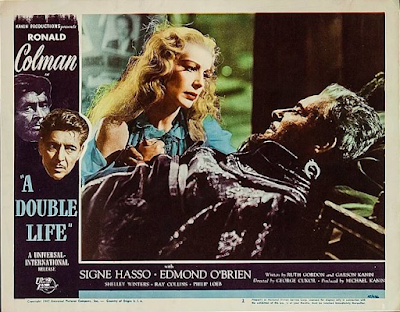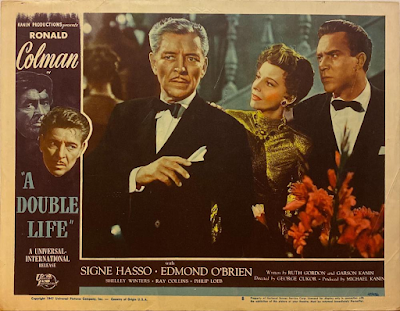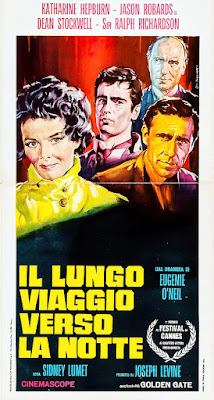Wonderland Burlesque's
Let's All Go To The Movies:
Cracked Actors
Part 2 of 2
Today, we take a look at motion pictures dealing with fictional Cracked Actors, performers who are truly losing their grip on reality.
Yes, it's the biz - show biz! All the glitz, all the glamour, all the glory.
It's all about getting your mug up there on the silver screen or getting that standing ovation. On the flip side - you're a never was, a could've been, a has-been, or a legend.
These are the used-to-be stars who now live with a touch of madness. Oh, yes... that which inspires great performances can turn on the practitioner, rendering the world at large risky or at great risk.
You know, they say creativity and madness go hand and hand. Today, it's all about actors truly losing their mind and what happens when the breach the tipping point!
There's quite a bit to unpack with these particular films, which I relish. It's all delish, so let's take a look and dish on all that glitters, but doesn't necessarily lead to gold!
Anthony John is an actor whose life is strongly influenced by the characters he plays. When he's playing comedy, he's the most enjoyable person in the world, but when he's playing drama, he's impossible to be around. That's why his wife Brita divorced him: although she loves him and still works with him, she couldn't stand to live with him anymore. So when Anthony has the role of Othello handed him, he devotes himself entirely to the part, but it soon overwhelms him and with each day, Othello's murderous jealousy fills his mind more and more.
The leading role had originally been slated for Laurence Olivier. Cary Grant was second choice, but he turned down the role because he was nervous about performing Shakespeare, plus, his agent convinced him that the role would be bad for his image. It was then offered to Fredric March and, ultimately, Ronald Coleman.

As a nervous seventeen year-old Shelley Winters read for the part of Scarlett O'Hara in 1939's Gone with the Wind using her Brooklyn accent. Cukor chased everyone out of his office, sent for two cokes, and advised her to go to college and visit public places to see how ordinary people walked and talked. It wasn't until after he had cast her in this film that he realized who she was.
The film's reputation has greatly improved over time. David Thomson called it "underrated," writing in The New Biographical Dictionary of Film that it was "invested with such intense psychological detail that the narrative faults vanish." Jonathan Rosenbaum wrote that it was "one of [Minnelli]'s last great pictures...The costumes, décor, and scope compositions show Minnelli at his most expressive, and the gaudy intensity - as well as the inside detail about the movie business - makes this compulsively watchable."
Over the course of one day in August of 1912, the family of retired actor James Tyrone grapples with the morphine addiction of his wife, Mary, the illness of their youngest son, Edmund and the alcoholism and debauchery of their older son, Jamie. As day turns into night, guilt, anger, despair, and regret threaten to destroy this dysfunctional family.
Adapted from the play by Eugene O'Neill, this drama was directed by Sidney Lumet and stars Katharine Hepburn, Ralph Richardson, Jason Robards, and Dean Stockwell.
This film won Best Actor for Richardson and Best Actress for Hepburn at the Cannes Film Festival and was named by the National Board of Review as one of the Top Ten Films of 1962. Hepburn’s performance earned her Oscar and Golden Globe nominations for Best Actress.
Producer Ely Landau did a version of O'Neill's The Iceman Cometh for television. It impressed the widow of Eugene O'Neill enough for her to give him the screen rights to Long Day's Journey Into Night. The cast and director formed a cooperative and agreed to work for a rate in exchange for a percentage of the profits.
Robards was the only actor from the stage version to also star in the film. He had won the Tony Award for Best Featured Actor in a Play in the 1957 Broadway stage version, and reprised the part in O’Neill’s sequel, A Moon for the Misbegotten. Marlon Brando was offered the role of Jamie, but turned it down.
At one point during rehearsals, director Sidney Lumet felt that Richardson wasn't truly capturing the essence of his character, James Tyrone, the family patriarch. Lumet took Richardson aside and launched into a 45-minute lecture about his character's motivations. Richardson finally stopped him by saying "I see what you mean, dear boy, a little more cello, a little less flute." Lumet confessed to being enormously impressed with this way of expressing it.
According to Hepburn biographer Charles Higham, she became so upset with Dean Stockwell when he showed up on the first day of shooting with a bottle of vodka, she almost struck him. When she discovered he found the set to be too cold, she bought him a coat, which he later found in his dressing room.
The film performed considerably less than expected at the box office and less than any of the other horror movies Price had made for AIP. In light of that, producer Samuel Z. Arkoff considered it the end of the horror cycle. I would be the last film Price made for AIP after a collaboration which began 14 years earlier with 1960's House of Usher.
During filming' in London, co-star Robert Quarry was singing in his dressing room as Price walked by. "I bet you didn't know I could sing, Vincent", said Quarry. "Well, I knew you couldn't fucking act", said Price.
There's quite a bit to unpack with these particular films, which I relish. It's all delish, so let's take a look and dish on all that glitters, but doesn't necessarily lead to gold!
--- ---
A Double Life
(1947)
Anthony John is an actor whose life is strongly influenced by the characters he plays. When he's playing comedy, he's the most enjoyable person in the world, but when he's playing drama, he's impossible to be around. That's why his wife Brita divorced him: although she loves him and still works with him, she couldn't stand to live with him anymore. So when Anthony has the role of Othello handed him, he devotes himself entirely to the part, but it soon overwhelms him and with each day, Othello's murderous jealousy fills his mind more and more.
This film noir was directed by George Cukor, with screenplay aby Ruth Gordon and Garson Kanin, and stars Ronald Colman, Signe Hasso, Edmond O'Brien and Shelly Winters.
Colman was initially anxious about doing Shakespeare on screen. To reassure him, Cukor told the actor that the film had been designed to get him a long-overdue Oscar, as Colman had been nominated three times before.

After shooting wrapped, Cukor presented Winters with a bust of Ronald Colman. The novice actress responded by giving him a box of pills for stomach cramps and heartburn.
Ronald Colman won the Academy Award for Best Actor for his performance in this film. Others nominated included: Cukor for Best Drector, Gordon and Kanin for Best Original Screenplay. Coleman also won a Golden Globe, while Cukor was nominated at the Venice International Film Festival for the Grand International Prize of Venice.
Despite winning a Best Actor Oscar for this film (his third nomination), Ronald Colman made only three more feature films over the next 10 years until his death in 1958.
This was the first of five collaborations between Cukor and the husband-and-wife writing team of Garson Kanin and Ruth Gordon between 1947 and 1980
Miklós Rózsa's music, for which he won his second Academy Award, mixes his own modern idiom with passages in the Venetian style of the sixteenth century. The composer later adopted the title Double Life for his 1982 memoir to signify the division in his career between absolute music and Hollywood film scores.
Ronald Colman won the Academy Award for Best Actor for his performance in this film. Others nominated included: Cukor for Best Drector, Gordon and Kanin for Best Original Screenplay. Coleman also won a Golden Globe, while Cukor was nominated at the Venice International Film Festival for the Grand International Prize of Venice.
Ronald Coleman and Signe Hasso
The Country Girl
(1954)
A director offers a washed-up, alcoholic has-been singer/actor the chance to make a comeback as the lead in his new musical. However, insecure as ever, the actor crawls right into the bottle, causing havoc while shunning all responsibility. Instead, it all falls on the shoulders of his wife, who finds the situation and their relationship harder and harder to manage. The director tries to rescue the actor before he drowns in a sea of booze, believing, right or wrong, that the root of all the actor's problems is... his wife.
Bing Crosby's first instinct was to turn down the role. First, he told them he didn't want to play opposite what he considered a lesser actress. Grace Kelly's Oscar nomination for her work on 1953's Mogambo made that point moot. Then, he was afraid that he was too old for the part. First day on the set, the director, George Seaton, noticed the typically prompt Crosby was absent. Tracking the actor down, he discovered Crosby still seated in a make-up chair all nerves, wearing an old toupee from a film he'd made in 1933. Seaton talked him off the ledge, and the two had a discussion about how it's okay to look your age.
Once filming began, Crosby was soon won over by Kelly's dedication and professionalism. In fact, he became smitten with her and the two enjoyed a brief affair while filming.
For his big drunk scene, Crosby had sons Dennis and Phillip keep him up all night so that he'd look the part. The scene went well... maybe too well; Crosby's mother was on the set that day and was so horrified by what she saw she stormed off, vowing to never watch the finished product.
Crosby's mother was not alone; clergy members and parishioners of the Catholic church bombarded the studio with letters protesting Crosby playing a drunk.
Oscar winner Jennifer Jones was the studio's first choice for the pivotal role of Georgie, the wife. However, in light of the fact that she was pregnant, she turned down the part. Paramount then set its eyes on Kelly, who was under contract with MGM. The studio initially refused to loan her out, but Kelly, who had a keen nose for worthy roles, threatened to quit making movies altogether unless allowed to play the role. MGM reluctantly complied, stipulating that Kelly then had to star in the film Green Fire. The 1954 movie proved to be Kelly's least favorite, saying of the role, "This is not what I wanted to be an actress for."
The legendary Edith Head, who chose Kelly's wardrobe for the film, dressed the glamourous star in heavy, brown woolen clothing, cardigan sweaters, and low-heeled Capezios to achieve the correct effect.. Head said, "I had to take one of the most beautiful woman in the world and make her look plain and drab."
During filming, Kelly had affairs with Crosby, Cark Gable, William Holden and David Niven. Crosby was so smitten, he proposed marriage, but the actress turned him down. The two would later be reteamed for 1956's High Society, where they play a divorced couple who reunite.
Judy Garland, who'd made a huge comeback with her tour de force performance in 1954's A Star Is Born, was the odds on favorite to win a Best Actress at that year's Oscars. The star was in the hospital at the time of the ceremony, recovering from the birth of her son, so a camera crew had been dispatched to catch her reaction when her name was announced. Except it wasn't. In one of the closest Oscar races in the award's history, Kelly beat out Garland by a mere six votes. Groucho Marx voiced everyone's outrage in a telegram sent to Garland calling it "the biggest robbery since Brinks".
--- ---
2 Weeks In Another Town
(1962)
Former film star Jack Andrus is released from a sanitarium where he has lived for the previous three years, suffering from alcoholism, a traumatic automobile accident, and a severe mental breakdown. He's been offered two weeks of work in Rome by Maurice Kruger, his old director, who himself is near the end of his fading career and under pressure from his frugal Italian producer to finish the picture on time and under budget. Jack is also pressed from a manipulative ex-wife, a rising but self-destructive young star, the director's shrewish wife, and a temperamental Italian diva who requires handling with kid gloves. When the director, Kruger, suffers a heart attack, Andrus views the opportunity as a last chance at the redemption of his personal life and professional career.
Based on a 1960 novel by Irwin Shaw, this drama was directed by Vincente Minnelli and stars Kirk Douglas, Edward G. Robinson, Cyd Charisse, Claire Trevor, Daliah Lavi, George Hamilton, Rosanna Schiaffino, Leslie Uggams, Erich Von Stroheim, and James Gregory.
This film was created by the same team that worked on The Bad and the Beautiful: director (Vincente Minnelli), producer (John Houseman), screenwriter (Charles Schnee), composer (David Raksin), male star (Kirk Douglas), and studio (MGM). Both movies feature performances of the song Don't Blame Me: sung by Leslie Uggams in Two Weeks in Another Town and by Peggy King in The Bad and the Beautiful. In one scene, the cast watches clips from The Bad and the Beautiful in a screening room, passing it off as a movie in which Douglas's character, Jack Andrus, had played the lead.
The last of three Kirk Douglas films produced by John Houseman. The others were 1952's The Bad and the Beautiful and 1956's Lust for Life.
Kirk Douglas was adamantly against the casting of Cyd Charisse. He also insisted that Cyd Charisse be billed under the title and not given equal billing with himself and Edward G. Robinson.
Kirk Douglas was paid $500,000 for acting in this film, and was also entitled to 10% of the profits (but there weren't any). Cyd Charisse, on the other hand, was paid $50,000.
George Hamilton was cast as "a troubled, funky James Dean-type actor, for which I couldn't have been less appropriate", he later admitted.
The story was seen by some as a depiction of the relationships among Tyrone Power, Linda Christian and Darryl Zanuck.
The film ran into problems with the MPAA and the conservative studio executives at MGM, which wanted to transform the project into a 'family film' and had it re-edited without Minnelli's input, reducing the total running time by 15 minutes. Both Minnelli and Houseman protested, but to no avail. An orgy-party scene inspired by Federico Fellini's La Dolce Vita was deleted, as well as a melancholy monologue by Cyd Charisse which was supposed to humanize her character. Kirk Douglas later wrote in his 1988 autobiography that "this was such an injustice to Vincente Minnelli, who'd done such a wonderful job with the film. And an injustice to the paying public, who could have had the experience of watching a very dramatic, meaningful film. They released it that way, emasculated."
--- ---
Long Day's Journey Into Night
(1962)
Robards was the only actor from the stage version to also star in the film. He had won the Tony Award for Best Featured Actor in a Play in the 1957 Broadway stage version, and reprised the part in O’Neill’s sequel, A Moon for the Misbegotten. Marlon Brando was offered the role of Jamie, but turned it down.
When Lumet approached Hepburn in her home, she received him without even saying hello or 'how do you do,' and abruptly asked him a technical question about the film. Lumet said that he was not disappointed by this behavior, on the contrary, he already knew at this point that she was perfect for the role.
--- ---
Madhouse
(1974)
AKA: The Revenge of Dr. Death
A horror movie star returns to one of his most famous roles after spending years in a mental institution. All seems well, however, the character now appears to be committing murders independent of the actor's will.
Based on the 1969 novel Devilday by Angus Hall, this British-American horror film was directed by Jim Clark for Amicus Productions in association with American International Pictures and stars Vincent Price, Natasha Pyne, Peter Cushing, Robert Quarry, Adrienne Corri, and Linda Hayden. Film credits include special participation by Basil Rathbone and Boris Karloff. Both men were deceased, having died in the late 60's. However, they appear in clips from real films they acted in with Vincent Price: Rathbone in 1962's Tales of Terror and Karloff in 1963's The Raven.
Vincent Price and Richard Quarry
--- ---
And that's all for now.
Tune in next week...
Same time, same channel.
Madhouse - Trailer
(1974)
















































































3 comments:
Ohhh this one was good!
I can just imagine people mad cause a movie depicted a drunk. Ugh.
And I just watched To Catch a Thief. I can see why all those men fell for Grace Kelly.
And TBH Kirk Douglas was Daddy.
XOXO
Long Day's Journey is a terrific film, IMO.
Oh, brother, I worked with an actor who "lived the parts" he played. The further into rehearsals, the more he'd take on those habits, etc, of the character offstage. It was nuts.
And, course, working in the theatre, there's always the drunks....
Grace Kelly, one of the most beautiful women of all time
Post a Comment